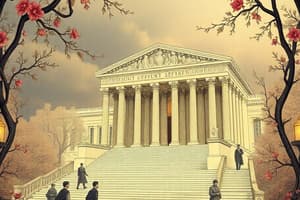Podcast
Questions and Answers
What is the main argument of Federalist No. 78?
What is the main argument of Federalist No. 78?
- Congress can override Supreme Court decisions.
- The federal courts have the duty to determine whether acts of Congress are constitutional. (correct)
- The President has supreme authority over the judiciary.
- The judiciary branch should be elected.
What is judicial review?
What is judicial review?
The power of the courts to declare laws unconstitutional.
What is the President's role termed as the 'Power of the Sword'?
What is the President's role termed as the 'Power of the Sword'?
Commander-in-chief and chief executive.
What does the 'Power of the Purse' refer to?
What does the 'Power of the Purse' refer to?
Many people felt that an unelected judiciary could be dangerous.
Many people felt that an unelected judiciary could be dangerous.
Why is the judiciary considered the weakest branch of government?
Why is the judiciary considered the weakest branch of government?
How does life tenure for justices affect their decision-making?
How does life tenure for justices affect their decision-making?
What role does judicial review play regarding Congress?
What role does judicial review play regarding Congress?
What is the purpose of the judicial branch?
What is the purpose of the judicial branch?
Flashcards are hidden until you start studying
Study Notes
Overview of Federalist No. 78
- Federalist No. 78 argues for the judiciary's role in determining the constitutionality of Congressional acts.
- Claims that the Constitution must prevail in cases of conflict between laws and constitutional principles.
Judicial Review
- Judicial review allows courts to declare laws unconstitutional.
- Establishes a critical check on Congressional power, ensuring legislative actions remain within constitutional boundaries.
Powers of Government
- Power of the Sword: Refers to the President's authority as commander-in-chief, enforcing laws and national defense.
- Power of the Purse: Congress holds the financial power to tax, spend, and control government funding.
Public Concerns
- Many citizens expressed concern over an unelected judiciary, fearing potential dangers posed by lifetime appointments and lack of accountability.
- The perception of judicial independence was complex due to its non-elected status.
Judiciary as the Weaker Branch
- Described as the "weakest branch" because it lacks control over the military (sword) and financial resources (purse).
- Relies on the other branches (Executive and Legislative) for enforcement of its rulings.
Independence of Justices
- Life tenure for justices is intended to insulate them from political pressures, allowing them to faithfully interpret the Constitution.
- Elected judges might prioritize public opinion over constitutional adherence, jeopardizing judicial integrity.
Purpose of the Judiciary
- The main role of the judiciary is to ensure laws and policies are constitutional, safeguarding citizens' liberties.
- Functions as a protector of constitutional rights, reinforcing the principle of limited government authority.
Conclusion of Federalist No. 78
- Emphasizes the importance of an independent judiciary in a balanced government.
- Advocates for judicial checks as vital for the preservation of democratic values and the Constitution.
Studying That Suits You
Use AI to generate personalized quizzes and flashcards to suit your learning preferences.




